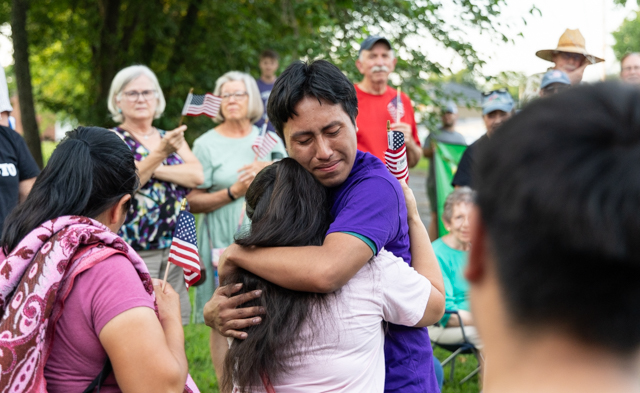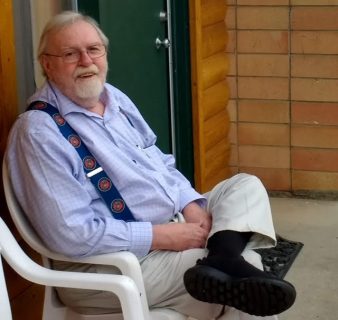Book review: ‘The Great Alone’
Published 12:00 am Sunday, August 12, 2018

- BOOK REVIEW
“The Great Alone” by Kristin Hannah. New York: St. Martin’s Press, 2018. 448 pages, $28.99 (hardcover).
Alaska, 1974. Unpredictable. Unforgiving. Untamed. For a family in crisis, the ultimate test of survival. Ernt Allbright, a former POW, comes home from the Vietnam War a changed man. When Ernt loses another job, after a string of moves and losses, he gets a letter from the father of an old buddy who died – he has been left land and a house in Alaska. He makes the impulsive decision to move his family north where they can live off the grid and escape his nightmares. Thirteen-year-old Leni, tired of moving and hoping her father will get better, hopes this will be the answer. She knows her parents’ relationship may not quite be normal and is stormy and dangerous, but she wants to belong. Her mother, Cora, will do anything for her husband.
At first, Alaska seems to answer their prayers. In the wild and the long days, things become better, and the community helps them prepare when they realize how unprepared they are. However, as winter comes and darkness lasts longer than the light, Ernt begins to deteriorate, and they start to fracture. Leni begins to learn that they are on their own, and there is danger lurking more closely in the cabin than in the winter outside their door.
There are novels that speak to your soul, your history, your past and your experiences. Although I have never been to Alaska, there were so many elements within this story that I understood from the depths of my heart. Leni is one of those rare, amazing characters that you are able to form a connection with, and see the story from the chaos in her heart and mind. In a world of isolation and beauty, she grows to find herself and learn who she truly is. Through her journey, we experience the true wilderness of Alaska, the untamable winters and the community feeling that never leaves.
I think it is important to understand the main family dynamic within this book, and that is Leni’s parents who are trapped in a love that is warped and harmful to them both. There is emotional and physical abuse between the two, and for some, this book may be too close to their own experiences to read. Leni’s father came back from Vietnam with demons, and though Leni’s mother always says he was different before the war, the reader is left with doubt about this. He is emotionally and physically abusive, and she plays on his emotions, as well. To others, I think it personally is a pretty accurate painting of many abusive relationships and the issues they all face. There is love in this novel of all types: young love, wild love, abusive love, all-encompassing love, family love and community love for one another. It is sometimes hard to read the story as it progresses, yet it was worth the emotional roller coaster.
The story of Kaneq, Alaska, is a beautiful one wrapped in survival and people running away from their former lives. Some of the members were born there, grew up there and Alaska is in their very soul, and others moved there after a traumatic experience, or are the loners we do not see often in the story. This community takes up Leni’s family as one of its own, and teaches them how to survive in the wilderness and harshness of the winter. It makes one think “Winter is Coming” means something entirely new in this world, but with the same level of danger.
As the story progresses, time jumps from here to there, and we are able to watch Leni grow up, fall in love and struggle with who she is, what she wants and whether she is able to let go of the past or leave her mother behind. We also come to know the community of Kaneq, and fall in love with its inhabitants, especially Large Marge, who was my favorite character of them all, from her own back story that she eventually shares, to how much she is willing to help those around her. She is also a powerful community member, and an excellent example of someone trying to help others, erase her own sadness and past and keep history from repeating itself.
The story takes some turns I did not expect, and more than a few times it’s an emotional punch in the gut. Even with all the emotional wreckage, it is worth it entirely. There were more than a few times I found tears pouring down my face, and trying to hide them before my son saw me balling my eyes out. At the end, I could not put the book down, and stayed up reading it until 2 a.m. The ending is uplifting and hopeful, and helps make the rest of the story more bearable. However, above all, I think Hannah did what she does best – she told the story of a real family without the fairytale, and showed the sad, horrible side of what some have lived through. She wrote a story based firmly in reality (for the most part), and shared what this journey must be like for some with beautiful writing and storytelling.
Spoiler warning: This book should almost have a caution warning on it. It deals with emotional and physical abuse, and cancer. Some of the story is truly difficult to read, especially as I have had those lost to cancer who were especially close to me, and that was difficult to read. I’ve also seen emotional abuse firsthand, so that too could be difficult to read at times.
I actually picked this for my book club to read, after having read “The Nightingale” by Hannah, which was truly an amazing work of historical fiction (it was named the Goodreads Best Historical fiction novel for 2015 and won the People’s Choice award for best fiction), that also left me heartbroken and reeling from such an in-depth story. “The Great Alone” was no different, and for the first time in a long time, my book club agreed on how much we, as a collective whole, loved the story, the characters and the settings.
– Reviewed by Fallon Willoughby, School of Professional Studies, Western Kentucky University.






